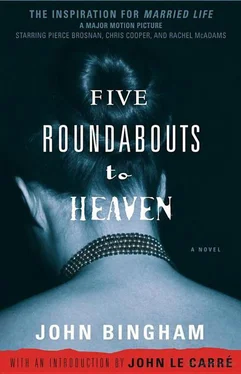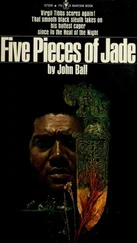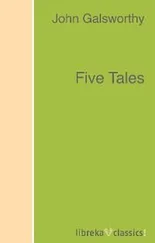John Bingham - Five Roundabouts to Heaven
Здесь есть возможность читать онлайн «John Bingham - Five Roundabouts to Heaven» весь текст электронной книги совершенно бесплатно (целиком полную версию без сокращений). В некоторых случаях можно слушать аудио, скачать через торрент в формате fb2 и присутствует краткое содержание. Жанр: Криминальный детектив, на английском языке. Описание произведения, (предисловие) а так же отзывы посетителей доступны на портале библиотеки ЛибКат.
- Название:Five Roundabouts to Heaven
- Автор:
- Жанр:
- Год:неизвестен
- ISBN:нет данных
- Рейтинг книги:4 / 5. Голосов: 1
-
Избранное:Добавить в избранное
- Отзывы:
-
Ваша оценка:
- 80
- 1
- 2
- 3
- 4
- 5
Five Roundabouts to Heaven: краткое содержание, описание и аннотация
Предлагаем к чтению аннотацию, описание, краткое содержание или предисловие (зависит от того, что написал сам автор книги «Five Roundabouts to Heaven»). Если вы не нашли необходимую информацию о книге — напишите в комментариях, мы постараемся отыскать её.
Five Roundabouts to Heaven — читать онлайн бесплатно полную книгу (весь текст) целиком
Ниже представлен текст книги, разбитый по страницам. Система сохранения места последней прочитанной страницы, позволяет с удобством читать онлайн бесплатно книгу «Five Roundabouts to Heaven», без необходимости каждый раз заново искать на чём Вы остановились. Поставьте закладку, и сможете в любой момент перейти на страницу, на которой закончили чтение.
Интервал:
Закладка:
I have come across some quaint households in my time, but nothing that could beat the extraordinary set-up into which Philip Bartels, a lonely and sensitive child, was pitchforked at the impressionable age of thirteen.
There was laughter enough in my home, but the only jokes which amused me when I visited Bartels were quite unintentional and entirely due to the farcical goings-on in that incredible place.
As for friends popping in for a chat, any acquaintances who called, for one reason or another, took their departure as soon as decency permitted, and I don’t blame them.
Yet they were not wicked people. All the people in this record were fundamentally good people, apart from myself, perhaps; which possibly makes the tale of some slight interest, for crime involving wicked people is common enough.
Bartels’ relations were kind and generous. They were very fond of each other, too, and would have given their last stick of furniture to help each other in case of dire emergency. But they were so occupied with the affairs of this world-and indeed of the next world, too-that they had little time to lavish upon Bartels the love which a child needs.
I got to know them well over the years, for I was an only child and glad enough to go round there two or three times a week in the holidays. In the end, I even called them aunt Rose, and uncle James, and aunt Emily, as though they were my own relations.
The house in which Bartels lived was situated off Bayswater Road, its exact address being No. 257 Melville Avenue.
The word conjures up a double row of trees, but if there had ever been any trees in Melville Avenue they must have been long since chopped down, or, more likely, have died of blight. In either case it must have been a merciful release for them.
There was no real colour in Melville Avenue. The houses, each hugging its neighbour, each with its two stucco pillars on either side of a flight of steps, were painted in tones which appeared to have been primarily chosen for their drabness. Some were fawn, some grey, and some had their pillars painted a curiously depressing shade of chocolate brown, or even black. The house owned by aunt Emily had once been painted the shade of weak mustard.
Behind each house was a small garden, bordered by a grimy brick wall, and here lurked various dark-leaved shrubs and trees. Some house-owners tried to grow a patch of lawn-Bartels’ uncle had tried to do so-but the earth was black and sour and full of broken bricks and stones, and the grass grew only thinly and coarsely.
At No. 257 the square of rank grass, with its bald patches and ragged edges, had been surrounded by Bartels’ aunt Rose with a border of large seashells, which made it particularly repulsive. Along the wall at the end of the garden an endless procession of cats passed by day and by night. Some were tabby, some black, some tortoiseshell or white, and a few displayed such a variety of colour and design as to make the imagination boggle at the broad-mindedness of their ancestors.
No. 257 Melville Avenue, like all the neighbouring houses, had a ground floor and basement, and two other stories. Bartels’ aunt Rose, and her husband James, aunt Emily, Cook, and Bartels himself occupied the ground floor and basement.
The first floor was let to a retired district commissioner from East Africa, whose name I have forgotten. I would sometimes see him and his wife passing down the stairs, a spare, yellow-faced, unhappy-looking couple. He had obtained a job as secretary in some minor West End club, and rarely returned until late at night.
Now and again, when my parents went away, I would spend a night at Bartels’ house; and I would hear the wife’s footsteps, as I lay in bed, pacing backwards and forwards, backwards and forwards, above my head. Once I heard sobbing. I think she was being driven mad by loneliness.
The top floor was let to an artist in his early thirties, and the woman whom he called his wife, though sometimes carelessly read-dressed letters led aunt Rose to remark good-humouredly that if Mrs Martin were asked to produce her marriage lines she might be hard put to it to find them. The Martins were a gay and happy couple, who kept much to themselves.
Sometimes they gave noisy parties which went on late into the night, and afterwards the guests would make their way on tiptoe, giggling and whispering, down the linoleum-covered stairs. I have sometimes wondered how the district commissioner’s wife felt, as she listened to the sounds of gaiety, so near and yet so far removed from her.
Aunt Rose and uncle James, as from force of habit I still think of them, lived on the ground floor with Bartels; aunt Emily and Cook lived in the basement. It is typical of the remarkable salesmanship of aunt Rose that although aunt Emily owned the house, aunt Rose and her husband occupied the best rooms, though they paid no rent, while aunt Emily lived in the basement.
The reason was clear enough, at least to aunt Rose, and lay in the fact that one day aunt Rose was going to be a millionairess, and was going to keep all the rest of the family in luxury for the remainder of their lives.
All that stood between her and untold riches-computed at compounded interest, the figure ran into hundreds of millions-was the little matter of winning a lawsuit against her husband’s cousin. It was known as Aunt Rose’s Case, and was a subject of incessant discussion.
It was a case with such tortuous ramifications that though I heard it explained a dozen times, though talk of it interrupted on countless occasions my evening games with Bartels, I never really got the hang of it.
I only know it was full of legitimate and illegitimate births, of stolen birth certificates, pages torn out of church registers, wicked sisters, old family nurses who remembered this, and old chief clerks who remembered that; all of whom were prepared to go into the witness box and swear that this or that did or did not happen.
True, one lawyer after another had turned the case down, or quarrelled with aunt Rose. This one had apparently been too weak; that one bribed by the opposition; a third intimidated; a fourth had had the audacity to demand some interim payment.
Invariably, when I returned for the holidays, she had at last found the right man, a real fighter, honest and unafraid of anybody. By Jove, he was going to make them sit up! The writs were going out next week, if Counsel’s opinion were favourable! But it never was.
Bartels’ aunt Rose was a short woman with fair hair, grey eyes, and a belligerent disposition, and prone to emphasize her words by pounding the table with her fist; in contrast, aunt Emily was tall, with a pale oval face, wide, dark, credulous eyes, and an earnest, anxious expression; she wore old-fashioned inexpensive jewellery, odd bits of lace and fur, and in her ears a pair of long black earrings.
There was one snag about aunt Rose’s lawsuit: there was always a bit of money which had to be paid out for something or other.
Uncle James had long since commuted his Army pension and had only a small family allowance left. So aunt Rose used to fall back upon aunt Emily for financial assistance.
I have often wondered whether aunt Rose was a rogue or a misguided woman, and have come to the conclusion that if she twisted aunt Emily out of every penny she could get out of her, which she did, she probably thought that she was really acting in the true interests of everybody. (Even I myself, though no blood relation, was going to benefit financially in some obscure way no longer clear to me, once the great case was won.)
Had she not a case which was just on the point of coming to court, which when won-and who could doubt it would be won! — would enable her to repay aunt Emily every penny she had had from her, including the years of unpaid rent, and enable everybody to buy rich estates in the country and live happily ever after?
Читать дальшеИнтервал:
Закладка:
Похожие книги на «Five Roundabouts to Heaven»
Представляем Вашему вниманию похожие книги на «Five Roundabouts to Heaven» списком для выбора. Мы отобрали схожую по названию и смыслу литературу в надежде предоставить читателям больше вариантов отыскать новые, интересные, ещё непрочитанные произведения.
Обсуждение, отзывы о книге «Five Roundabouts to Heaven» и просто собственные мнения читателей. Оставьте ваши комментарии, напишите, что Вы думаете о произведении, его смысле или главных героях. Укажите что конкретно понравилось, а что нет, и почему Вы так считаете.












